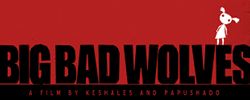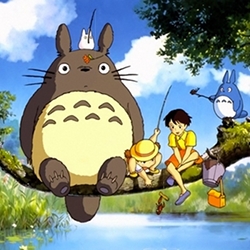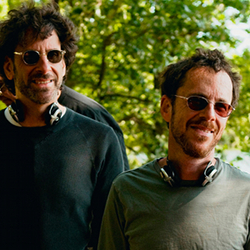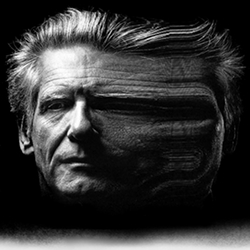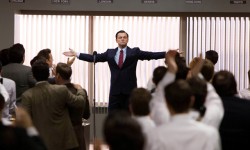
Review: The Wolf of Wall Street (2013) - NP Approved
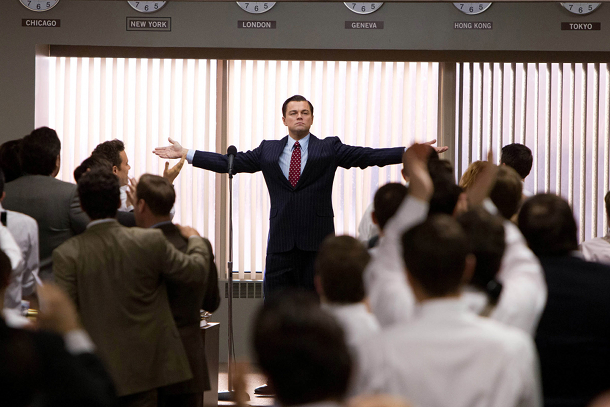
Cast: Leonardo DiCaprio, Matthew McConaughey, Jonah Hill
Director: Martin Scorsese
Country: USA
Genre: Biography | Comedy | Crime | Drama
Official Site: Here
Editor’s Notes: The Wolf of Wall Street opens wide Christmas Day, December 25th. For an additional perspective on the film, read David’s review (89/100).
Martin Scorsese is a master at making compelling films about horrible people. His aim is never particularly to make you feel sympathy for them or to glamorize them but to show the seedy underbelly of society that isn’t often shown in fiction films. Normally, he makes films about low-level gangsters like in Mean Streets (1973), Goodfellas (1990) and Casino (1995) or people on the bottom who can’t seem to get up like Taxi Driver (1976) and Bringing Out the Dead (1999). Occasionally, he’ll make a biopic about a famous lowlife as in Raging Bull (1980) or someone with intense mental instability like The Aviator (2004). His latest film, The Wolf of Wall Street combines much of those themes into one long trek of a film.
The story centers on the rise and fall of Jordan Belfort (Leonardo DiCaprio), a man with a middle-class upbringing who became an enormously rich stockbroker on Wall Street in the late ‘80s through the 90’s. It’s a sex and drug filled cornucopia of excess. Most of what Jordan does is illegal, both on the trading floor and off. He pops Quaaludes like they are candy and snorts cocaine out of prostitute’s various orifices, marries the woman he cheats on his wife with (not illegal but on similar moral standing) and even kinda-sorta offers a bribe to an FBI investigator.
Martin Scorsese is a master at making compelling films about horrible people. His aim is never particularly to make you feel sympathy for them or to glamorize them but to show the seedy underbelly of society that isn’t often shown in fiction films.
The primary story line is that Jordan is mentored early on by one Mark Hanna (Mathew McConaughey, who is in the film far too little for my liking) and when the market crashes in 1987, Jordan is out of a job. He starts applying his Wall Street teachings to the penny stock trade and wows his new coworkers. He meets Donnie Azoff (Jonah Hill) and they start their own firm together, which grows into a powerhouse on Wall Street. His and his partners’ excessive behavior ultimately leads to their ruin.

Scorsese and screenwriter Terence Winter chose to tell this rise and fall story with epic scenes of monumental debauchery. There is more nudity in this film than in any other Scorsese film I can recall and more drug use than even Goodfellas or his friend Brian Di Palma’s Scarface (1983). While some people call this approach glamorizing and glorifying of this kind of behavior, I call it subtle moralizing. There are no characters in the film that act as a conscience for these guys. No one is there to tell them to stop doing what they are doing or it will all fall apart, except Jordan’s father Max who is wonderfully played by writer/director and far too infrequent actor Rob Reiner, but he is often marginalized because they don’t want to listen to him and he works for his son and makes a lot of money so he doesn’t speak up that often. What Scorsese is doing here is showing us what happens when life is lived to an untenable extreme without telling us how wrong it is. He trusts that people can figure out that what these people are doing is wrong, not just on the drugs and sex but also the fleecing of people’s money.
Not everyone seems to be getting that, though. Many reviews decry the celebrative nature of the acts depicted. There is even an open letter to the filmmakers and the real Jordan Belfort by a woman whose father worked with Belfort. She blames Belfort for her father’s behavior and what happened to her and her family as a result of it all and urges people not to see the film because it makes it all seem so fun. This tells me she either didn’t see the film or is unfamiliar with Scorsese’s work.
There are many standouts in this fantastic picture. One of which is the humor that pervades the film. The much-discussed ‘Quaalude Crawl’ sequence is a particular gem.
In fact, many people seem to miss the ‘fall’ part of a rise and fall film. As recently as this year, in the film Spring Breakers, the James Franco character states that he has Scarface on repeat “Constant, y’all” and he lives his life like the Pacino character, forgetting that he dies in epic fashion after being completely destroyed by his own lifestyle. That is what people tend to forget about films like Raging Bull, Goodfellas and Casino. At the end, these guys lives are shattered. They are in no way shape or form the men they were when they were on top, some are dead and some have lost everything they held dear. That is what happens in The Wolf of Wall Street as well. For all the highs and ecstasies Jordan Belfort experiences, he is nothing afterward.
There are many standouts in this fantastic picture. One of which is the humor that pervades the film. The much-discussed ‘Quaalude Crawl’ sequence is a particular gem. Another are the performances, led by DiCaprio. He hasn’t been this exuberant in years. He makes Jordan Belfort come alive in so many ways it’s a little eerie, just like he did for Howard Hughes in The Aviator. Part of this may be because of his famous past (and some argue his present) where he was actually snorting cocaine off of prostitute’s behinds. He brings this sort of manic energy to the film that is normally brought by Scorsese’s camera. Jonah Hill gives another great performance as Belfort’s right-hand-man Donnie. He’s funny and pathetic all at once, and those prosthetic teeth….I’m just not sure I have words for those teeth.
About Scorsese’s camera. Many have said that Scorsese seems to be sidelined by the performances and the script. I disagree. Some of what they are seeing is a cinematographer that has never worked with Scorsese before and may not have the shorthand that he and Michael Ballhause or Robert Richardson have developed with him over the years. But I think Scorsese is all over the picture, complete with his trademark always moving camera. There is a frenetic energy that pervades the film and sustains it through its mammoth 179 minute runtime. The film never felt long nor did if feel like it dragged at all.
When all is said and done, is The Wolf of Wall Street one of Scorsese’s best films? No, it is not. But, considering that he’s never really made a bad film and most of his pictures are classics or near classics, this one fits right in. It’s not a masterpiece, but its close and I think it will occupy that space where the great-yet-underappreciated Gangs of New York (2002) exists in. It’s a film that will be misinterpreted and possibly endlessly played in stockbroker boiler rooms like Wall Street (1988). If you see this (and I highly recommend you do) or rewatch any of the other films I’ve mentioned, pay close attention to the falls then ask yourself if that’s the kind of end you’d like to meet if you want to get to those highs.
Related Posts
![]()
Doug Heller
![]()
Latest posts by Doug Heller (see all)















